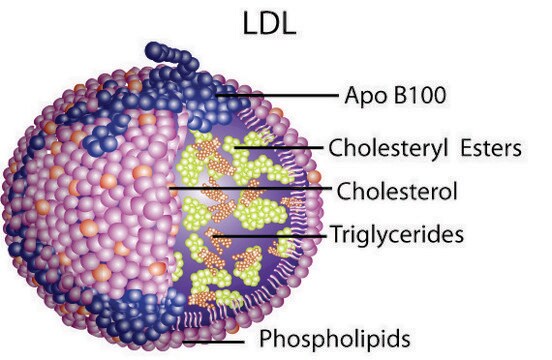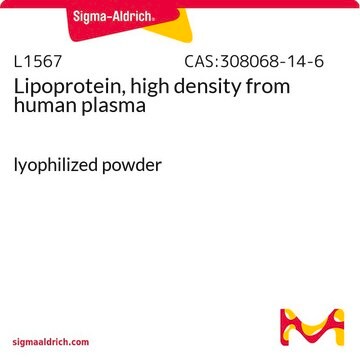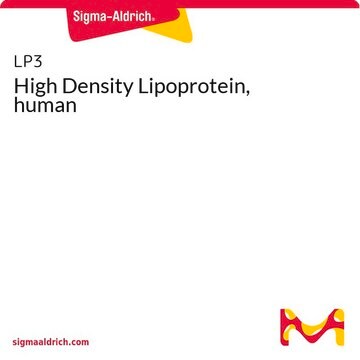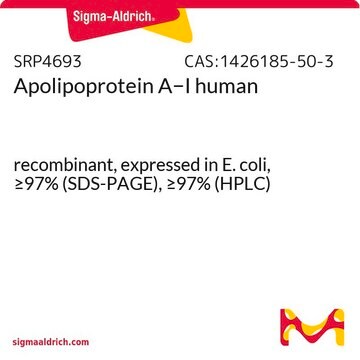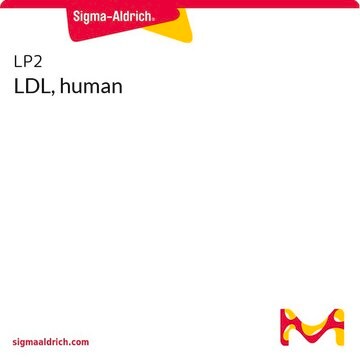추천 제품
생물학적 소스
human plasma
Quality Level
분석
≥95% (SDS-PAGE)
양식
solution
포장
vial of 10 mg protein
기술
cell culture | mammalian: suitable
작용기
ester
phospholipid
배송 상태
wet ice
저장 온도
2-8°C
유사한 제품을 찾으십니까? 방문 제품 비교 안내
생화학적/생리학적 작용
High density lipoprotein (HDL) serves as the transit agent for cholesterol away from blood, tissues, and organs of the body to the liver, where cholesterol breakdown occurs. This process ultimately helps to remove cholesterol from the arteries. Colloquially known as the "good cholesterol", HDL makes up 20%-30% of the total cholesterol in the body.
HDL is used in cardiovascular research and the development of potential therapeutic approaches to cardiovascular risk management.
HDL is used in cardiovascular research and the development of potential therapeutic approaches to cardiovascular risk management.
물리적 형태
Solution in 150 mM NaCl and 0.01% EDTA, pH 7.4.
기타 정보
View more information on lipoprotein function and lipid transport at www.sigma-aldrich.com/enzymeexplorer
면책조항
RESEARCH USE ONLY. This product is regulated in France when intended to be used for scientific purposes, including for import and export activities (Article L 1211-1 paragraph 2 of the Public Health Code). The purchaser (i.e. enduser) is required to obtain an import authorization from the France Ministry of Research referred in the Article L1245-5-1 II. of Public Health Code. By ordering this product, you are confirming that you have obtained the proper import authorization.
Storage Class Code
10 - Combustible liquids
WGK
WGK 2
Flash Point (°F)
Not applicable
Flash Point (°C)
Not applicable
개인 보호 장비
Eyeshields, Gloves, multi-purpose combination respirator cartridge (US)
가장 최신 버전 중 하나를 선택하세요:
시험 성적서(COA)
Lot/Batch Number
이미 열람한 고객
Kyung-Hyun Cho
Medicines (Basel, Switzerland), 8(7) (2021-08-07)
The composition and properties of apolipoprotein (apo) A-I and apoA-II in high-density lipoproteins (HDL) might be critical to SARS-CoV-2 infection via SR-BI and antiviral activity against COVID-19. HDL containing native apoA-I showed potent antiviral activity, while HDL containing glycated apoA-I
Mark J Cziraky et al.
Journal of managed care pharmacy : JMCP, 14(8 Suppl), S3-28 (2009-11-07)
Most clinicians recognize the importance of reducing low-density lipoprotein cholesterol (LDL-C) and, therefore, address this therapeutic need to decrease cardiovascular disease risk. In addition to the critical role that LDL-C plays, recent studies have shown the contribution of other lipid
Tisha R Joy
Pharmacology & therapeutics, 135(1), 18-30 (2012-04-03)
Reduction in low-density lipoprotein cholesterol (LDL-C) levels has been associated with a 25-30% reduction in cardiovascular disease risk. However, there still remains a significant and quantifiable risk. Since epidemiologic data have demonstrated that low levels of high-density lipoprotein cholesterol (HDL-C)
Santiago Redondo et al.
Lipids in health and disease, 10, 175-175 (2011-10-12)
Epidemiologic studies indicate a strong inverse correlation between plasma levels of high-density lipoproteins (HDL) and cardiovascular disease (CVD). The most relevant cardioprotective mechanism mediated by HDL is thought to be reverse cholesterol transport (RCT). New insights in HDL biology and
Menno Hoekstra et al.
Current opinion in lipidology, 23(2), 127-132 (2012-01-21)
Scavenger receptor class B type I (BI) is primarily known for its role in the selective uptake of cholesteryl esters from HDL, the final step in reverse cholesterol transport. Here, we will discuss findings that highlight the recently established novel
문서
Lipoproteins package cholesterol for transport in plasma, essential for lipid transport and cellular function in the body.
자사의 과학자팀은 생명 과학, 재료 과학, 화학 합성, 크로마토그래피, 분석 및 기타 많은 영역을 포함한 모든 과학 분야에 경험이 있습니다..
고객지원팀으로 연락바랍니다.